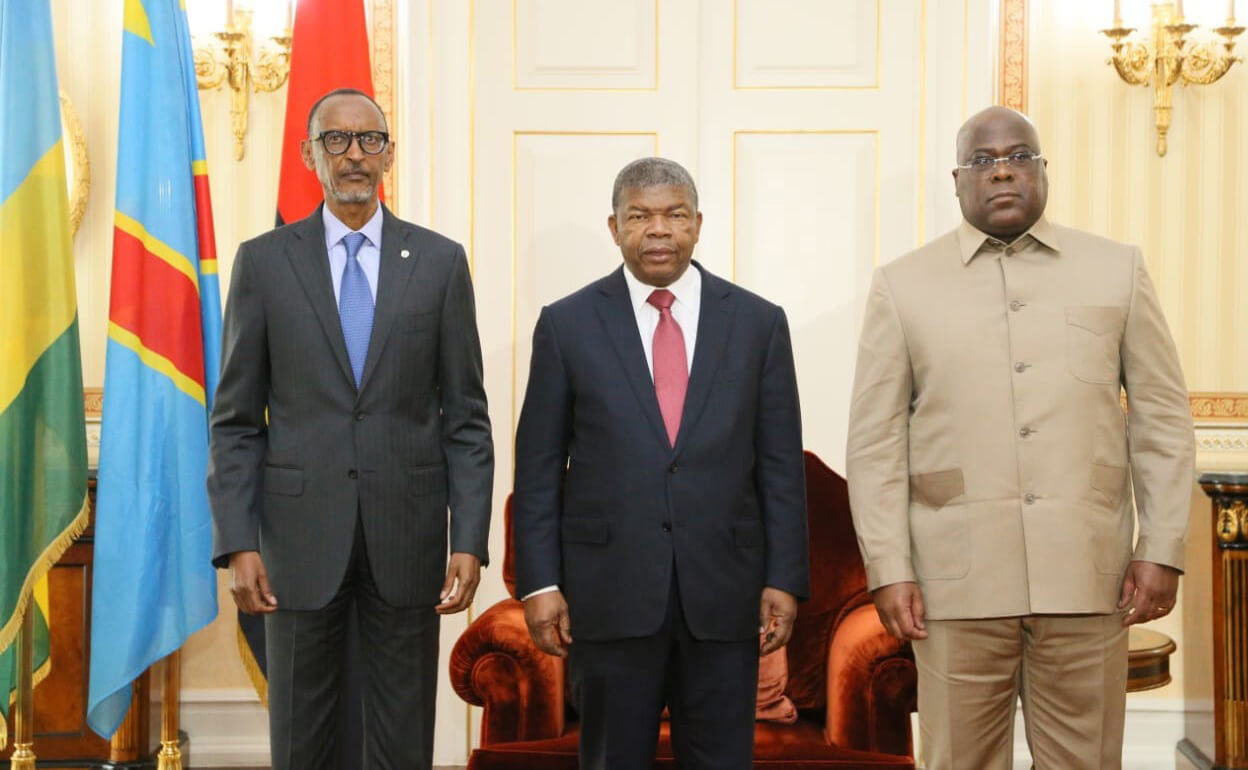In talks mediated by Angolan President João Lourenço, Rwandan President Paul Kagame and his Congolese counterpart Félix Tshisekedi agreed to an immediate cessation of hostilities under the “Luanda roadmap.”
According to a statement released by the presidential office of the Democratic Republic of Congo (DRC) following their meeting in the Angolan capital on Wednesday, Tshisekedi and Kagame spoke of the need to “move forward to get out of this crisis and restore trust between political leaders.”
To this end, the roadmap calls for the “immediate and unconditional withdrawal” of the M23 rebels operating in the Rwanda-DRC border region and establishes an ad hoc observation mechanism to be headed by an Angolan army officer; it will run parallel to another such mechanism under the auspices of the International Conference on the Great Lakes Region (ICGLR).
UPDATE:
— Rwanda Broadcasting Agency (RBA) (@rbarwanda) July 6, 2022
The Luanda Tripartite summit on security situation in eastern DRC concluded with an agreed upon roadmap to deescalate hostilities, that includes addressing the issue of FDLR while the issue of M23 to be dealt with domestically with in the framework of the Nairobi process. pic.twitter.com/QRp3p7FVIi
The two sides also agreed to resume negotiations via a bilateral joint commission, with officials from both sides set to hold their first meeting in Luanda next Tuesday.
Furthermore, they pledged to normalise diplomatic ties, return refugees to their country of origin, and respect one another’s sovereignty on all matters, including the ‘exploitation’ of natural resources.
President Lourenço hailed the summit for making “progress,” claiming that “there was perfect understanding” among the three leaders. Lourenço was appointed as a mediator by African Union President Macky Sall, and in his capacity as the chairperson of the ICGLR.
President Kagame expressed satisfaction with the outcomes of the summit, while President Tshisekedi thanked his Angolan counterpart for his mediation efforts, stressing that “it does not serve either country to have such a tense atmosphere.” In this respect, he acknowledged that “Lourenço’s efforts have helped to calm tension and improve relations between the two neighbouring countries.”
M23 spokesperson Willy Ngoma, meanwhile, said the rebel group has “no problem with the meeting,” adding, “We only support what they say and agree to consider our names.”
* Reactivate the Joint Intelligence Team Rwanda-DRC
— Stephanie Nyombayire (@PressSecRwanda) July 6, 2022
* Reconvening of Joint Permanent Commission (JPC) on July 12th in Luanda/Angola
(2/2)
Relations between the DRC and Rwanda have been strained since the 1994 genocide, following which many ethnic Hutus fled to the DRC, after having killed at least 800,000 ethnic Tutsis. The two have repeatedly levelled retaliatory accusations at each other for supporting rebel militias in their territories.
Kinshasa accuses Kigali of backing the M23 forces, who are ethnic Tutsis, and of sending disguised soldiers into its territory, and of unjustly exploiting its natural resources.
In fact, The M23 claims to have seized control of at least 14 areas in the DRC, including the capture of the strategic town of Bungana last month.
Keeping this in mind, Tshisekedi has warned, “The chances of war taking place are high. If the Rwandan aggression continues, we will not just stay. It’s not that we don't have power.”
Kagame, however, denies any such involvement and accuses Congolese authorities of dragging Rwanda into the DRC’s “internal crisis.” Rwanda has also accused the DRC of supporting the Democratic Forces for the Liberation of Rwanda, a Hutu rebel group whom it claims is made up of direct participants in the 1994 Rwandan genocide. Kagame has also lambasted the Congolese army for three incidents of cross border shelling this year and the illegal abduction of Rwandan soldiers.
The violence along their border has resulted in the displacement of nearly 170,000 people.
Against this backdrop, Kenyan President Uhuru Kenyatta led parallel reconciliation efforts last month under the Nairobi Peace Process, wherein regional leaders agreed to deploy the East African Regional Force to North and South Kivu provinces in DRC as a disarmament and counterterrorism effort.
“On records and with facts, DRC has been supporting FDLR, and unfortunately with the help of MONUSCO. That is how it happened that they were shelling our territory.” President Kagame. pic.twitter.com/u5VYrTRrlK
— Presidency | Rwanda (@UrugwiroVillage) July 5, 2022
The DRC expressed reservations about including Rwandan soldiers in the initiative. However, in an interview on July 4, Kagame had said that he had “no problem” with the exclusion, stating that “Rwanda is not complaining about it” and is “happy that this can be done without our involvement.”
He also lashed out at Tshisekedi for refusing to engage with the M23, alleging that “all of a sudden terrorists were born as an excuse to not continue with the political process.” He reaffirmed that war is not the solution, accusing Kinshasa of “behaving like spoiled kids; they cause trouble and then cry foul.”
He stressed that he favours a diplomatic resolution, reiterating that “you just don’t keep fighting and expect to find a solution for political crises, or for governance problems.”
These sentiments have been voiced by Rwandan Minister for Foreign Affairs Vincent Biruta as well, who has denounced the DRC’s “failure to implement” suitable measures to ensure security and stability in the region.
Rwanda has also accused the United Nations peacekeepers from MONUSCO of being complicit in the Congolese army’s violation of its territorial integrity. The DRC has also come under spotlight for instances of anti-Rwanda hate speech and protests.
To this end, Kagame has warned, “I wiIl wish for the best for all of us, Congo and Rwanda. But if the best doesn’t come, it should always find me prepared for the worst.” Likewise, Biruta has said Rwanda “has the means” to retaliate.
In this respect, Amnesty International researcher Jean Mobert Senga has urged for a “judicial mechanism to try all the perpetrators of serious crimes committed in the DRC over the past 25 or 30 years,” noting that justice remains integral to ensuring lasting peace in the region.

